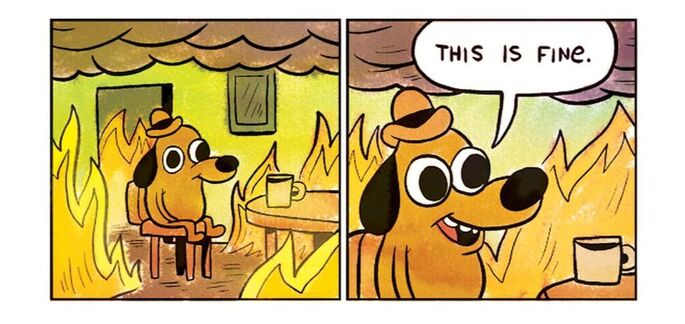Week One: this is fine
Before the webinar
- Create a journal for yourself
- Whatever works best for you. Make it fancy if you want! Or don’t. Just have it be something that will be easy for you to have with you and jot notes on throughout the series.
- Ideas:
- A moleskine or similar
- Composition notebook
- Text doc on your laptop or tablet or phone
- Evernote folder
- Every day for one week before the webinar, answer the following two questions in your journal:
- What things happened today that made me really stressed?
- Let go of “should” statements. Your responses may vary from day to day even if you performed the same tasks. Don’t worry about how it should be, try to reflect on how you feel.
- Be open to any response to this question, from “nothing” to “I can’t even pinpoint what’s stressing me out because I’m so overwhelmed.”
- What made me feel a sense of accomplishment today?
- What things happened today that made me really stressed?
- At the end of the week, look over your entries and see if you can identify any patterns.
- Note, all your journal responses are yours to keep or to share as you see fit. Do not feel obligated to share anything in the webinar sessions -- this is for you.
During the webinar
- Please try to participate as much as possible in the group activities. There will always be an anonymous contribution option to reduce pressure, but this works best when lots of ideas are presented.
- Don’t forget that all of these ideas are tools and resources and none of them is an obligation. Don’t feel like you have to implement all these suggestions into your life -- try only what sounds good to you and only continue to use things that work. Never add extra stress to your life in the name of organization.
After the webinar
- Assignment #1: Create one work-life boundary for yourself, either physical or virtual.
- Assignment #2: Review your journal entries from before and during the webinar and ask yourself how you work best. Some questions to help guide you:
- Are you a morning person or night person?
- Do you need routine to keep you on track or does it stifle your ability to work?
- Do you prefer to keep things online and on devices, or are you too easily distracted by the internet and social media?
- Assignment #3: Without actively tracking your time, try to estimate how long you spend on:
- Active research
- Teaching responsibilities
- Managerial tasks (lab/group related work that isn’t active research)
- Work emails
- Meetings/zoom calls
- Social media/internet black holes
- Cooking/cleaning/home management
- Exercise and wellness activities
- Hobbies
- Binging TV shows
- Anything else you think you might be spending a lot of time on that’s not included in this list -- feel free to come up with your own categories!
- Optional: Take at least one of the values assessments or personality tests included in the resources. You can take as many as sounded interesting to you, but for at least one of them, answer the following questions in your journal:
- How did the results change how you think about yourself?
- Were they surprising?
- What stood out to you?
- Can you use this to help determine how you want to spend your time and organize your life?
- Optional: start looking into some of the tools and resources and start thinking about which tools appeal, if any.
Tools and resources from week one
Some organizational tools and techniques to look into
Self-assessments
Books
Articles
Podcasts
- Google Drive
- Apple Notes/Tasks etc
- Asana
- Trello
- Wrike
- ToDoist
- ATracker
- Pomodoro technique
- Calendar apps
- Integrated tasks in google calendar, apple calendar, etc
- The bullet journal or dot journal method (huge variety of options here!)
Self-assessments
- Values assessments -- here is a simple online tool: https://personalvalu.es/
- VIA strengths assessment -- https://www.viacharacter.org/survey/account/register
- Myers Briggs Type Indicator (MBTI) -- this is an assessment you have to pay to take, but there are (unofficial, not sanctioned) online versions of the test, and you can read up about the sixteen types just about everywhere on the internet. https://www.myersbriggs.org/my-mbti-personality-type/my-mbti-results/, https://www.16personalities.com/, http://www.humanmetrics.com/personality/type
- Enneagram -- like the MBTI, the official version of this test costs money, but there are online versions of the test, or you can read about the different types and see what feels most accurate for you: https://www.enneagraminstitute.com/
Books
Articles
- Being organized is the gift I give myself and other people
- An Empath’s Guide to Surviving Academe
- 5 Ways to Say No Without Saying No
Podcasts
Webinar Slides
| week_one_upload.pptx |


